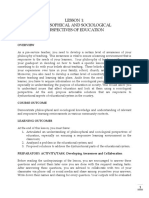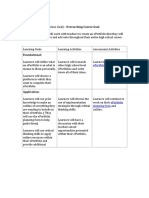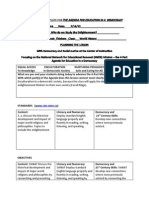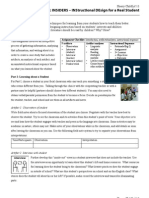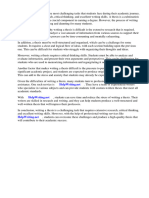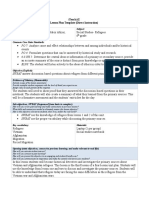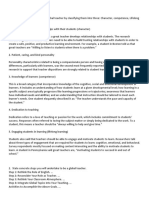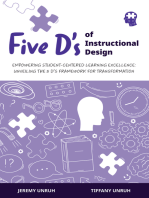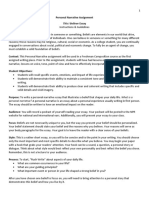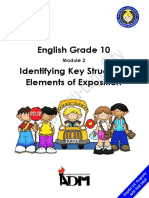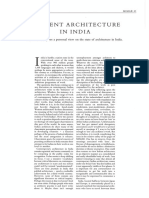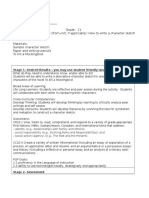HD 450 Fa15
HD 450 Fa15
Uploaded by
api-282907054Copyright:
Available Formats
HD 450 Fa15
HD 450 Fa15
Uploaded by
api-282907054Original Title
Copyright
Available Formats
Share this document
Did you find this document useful?
Is this content inappropriate?
Copyright:
Available Formats
HD 450 Fa15
HD 450 Fa15
Uploaded by
api-282907054Copyright:
Available Formats
Human Development Program
HD450 IP Reflective Teaching ( 1 4 units)
Start Date to End Date, 2015
Instructor name and Credentials
INSRUCTOR@pacificoaks.edu
INSTRUCTOR PHONE
Course Description
This class requires that students have a job or internship/apprenticeship which involves
them in ongoing work with children. Unit is based on 45 hours per unit of fieldwork,
reflective journal keeping and online seminar participation.
Program Learning Outcomes
PLO 1: Development: Students comprehend and analyze developmental theories.
PLO 2: Diversity: Students value diversity, demonstrate commitment to social justice, and
are able to analyze the dynamics of institutional and individual biases and use of power.
PLO 3: Communication: Students communicate clearly and effectively. They implement
and analyze individual, dyad and group communications for appropriate audience
reception, authenticity, and experience of empowerment for self and others.
PLO 4: Research: Students distinguish between observations and theory (reality and
fantasy, data and inferences/assumptions). Students collect verifiable and reliable data,
present their findings, and link their research with existing literature in the field.
PLO 5: Praxis: Students implement a philosophy of Education integrating developmental
theories guided by observation, and critical reflection, and analyze these actions according
to results and impact on other persons (ethics, values, principles and empowerment).
Students recognize and apply developmentally and culturally appropriate practice with
children and adults. Praxis experience may involve activities such as practica, field work,
or student teaching.
Student Learning Outcomes
1.
2.
3.
4.
Practice objective observations in a fieldwork/observation setting,
Continue to develop critical thinking skills,
Reflect on yourself and your work in the context of teaching, (PLO 1)*
Examine issues of bias and prejudice in self and in the working community, and
(PLO 2)*
5. Develop the capacity to act upon what is learned through observational and
reflective process. (PLO 3)*
Required Textbooks:
Required Readings:
Learning Together with Young Children: A Curriculum Framework for Reflective Teachers. Deb
Curtis and Margie Carter, (2007). ISBN: 978-1929610976, $ 44.95
Puzzling Moments, Teachable Moments: Practicing Teacher Research in Urban Classrooms.
Cynthia Ballenger, ( 2009). ISBN: 978-0807749937, $ 27.95
HD450-IP
Human Development Program
When Teachers Reflect: Journeys Towards Effective, Inclusive Practice. Elizabeth Tertell, ( 1998).
ISBN: 978-0935989854
Course Assignments
1. Written Assignments:
o Every other week you will have an in-class journal to thoughtfully respond to.
The journals will be 1-2 pages handwritten.
o You will also be given 3 Book Reflections from our book selections to
connect to, respond to, and reflect on. The Book Reflections will be 2-3
pages typed.
2. Observation Project:
o Observation and reflection are the heart of this class and will be what gives you
the hands-on experiences to see how reflective teaching can impact your growth
as a teacher and transform your classroom.
o You will complete 6 observations within your work site throughout the semester.
o You will respond to each observation in objective ways and reflect on what you
observed as well as how you will support learning through your observation
discoveries. Each reflection will be 1-2 pages typed.
o You will connect your observation to at least one Early Childhood Theorist.
o At the close of the semester, you will prepare a culmination of your observations
and reflections to share your discoveries with the class, making sure to make 23 theoretical connections throughout.
3. Teaching Role Models:
o Part 1: You will select a teaching role model that you aspire to be like. What
makes this teacher/individual special? Throughout the semester take notes
on the qualities that you find yourself being inspired by. Write a letter to this
Teaching Role Model about how they have impacted your experiences in
their field. Share what you admire and what you intend on carrying on.
o Part 2: You will reflect on how you might inspire others in the field of early
education. What do you do that might support others and light the fire within
them to continue on in the field. Write a letter to yourself highlighting what
you bring to the classroom and what you want your legacy to be. Dont be
modest!
4. Final Self-Evaluation
o Did you fulfill your goals in taking this class? How?
o How has this class added to your knowledge of the value of reflective
teaching?
o What contributions do you feel you made to others in this class? What
contributions did others make to you?
HD450-IP
Human Development Program
o Have you learned any new concepts that will continue to stimulate your
thinking? If so, give an example of what was useful to you. If not, give an
example of what you would have found useful?
o Reflecting on your writings and discussions, did you learn anything new
about yourself? Were you surprised by this knowledge? Describe why.
o How effectively has this experience worked for you? What problems have
you had with it?
Course Learning Assessment/Structure
(Students must maintain an overall 3.0 Grade Point Average for good academic standing)
Demonstrati
Demonstrati
Demonstrati
Demonstrati
Student Learning
on Level 1
on Level 2
on Level 3
on Level 4
Outcomes
Insufficient
Beginning
Skilled
Advanced
Grade
X - Fail
C
B
A
The student
The student
The student
The student
provided a
provided a
(1) Student will
provided an
provided a
skilled
sophisticated
identify and describe
incomplete
basically
description of
description of
the central issues in
and/or
adequate
the central
the central
the debate about
inadequate
description of issues related issues related
Evidence Based
description of
the central
to Evidence
to Evidence
Practices.
the central
issues related
Based
Based
(PLO 3)
issues related
to Evidence
Practice
Practice
Assessed by:
to Evidence
Based
written at an
written at an
Position Paper #1.
Based
Practice.
intermediate
advanced
Practice.
level.
level.
The student
The student
The student
The student
provided a
provided a
provided a
provided an
basically
skilled
sophisticated
incomplete
adequate
description of
description of
and/or
description of
(2) Student will
the central
the central
inadequate
the central
demonstrate the
theoretical
theoretical
description of
theoretical
capacity to complete
concepts and concepts and
the central
concepts and
an Empirically Based
treatment
treatment
theoretical
treatment
Treatment Protocol
interventions
interventions
concepts and
interventions
Case Report
of a
of a
treatment
of a
(PLO 1)
personality
personality
interventions
personality
Assessed by:
theory or
theory or
of a
theory or
Case Study Paper #3
combination of combination of
personality
combination of
theories
theories
theory or
theories
written at an
written at an
combination of
written at a
intermediate
advanced
theories.
beginning
level.
level.
level.
HD450-IP
Human Development Program
(3) Student will
demonstrate the
capacity to complete
an Adult Attachment
Interview Case
Report, including
attachment issues
and cultural
background (PLO 1,
5)
Assessed by:
Attachment Interview
Report Paper #4
The student
provided an
incomplete
and/or
inadequate
Adult
Attachment
Interview
Case Report,
including
attachment
issues and
cultural
background.
The student
provided a
basically
adequate
Adult
Attachment
Interview
Case Report,
including
attachment
issues and
cultural
background at
a beginning
level.
The student
provided a
skilled Adult
Attachment
Interview
Case Report,
including
attachment
issues and
cultural
background at
an
intermediate
level.
The student
provided a
sophisticated
Adult
Attachment
Interview Case
Report,
including
attachment
issues and
cultural
background at
an advanced
level.
Student shows
leadership in
small group
Student shows
Student shows
and class
Insufficient
strong
(4) Student will
discussions,
participation in
participation in
demonstrate the
Excellent
small group
Student shows
small group
capacity to work
rapport with
and class
adequate
and class
collaboratively with
peers and
discussions,
participation in
discussions,
peers and interact
problem
open conflict
small group
good rapport
appropriately with the
solves as
with peers,
and class
with peers,
course instructor.
needed,
unprofessional
discussions,
professional
(PLO 7, 8, 9).
strong
tone and
addresses
tone and
professional
demeanor in
conflict;
demeanor in
Assessed by:
tone and
communicatio acknowledges communicatio
Observation of
demeanor in
n with peers
feedback from
n with peers
Students
communicatio
and instructor;
peers and
and instructor;
Interpersonal
n with peers
unresponsive
instructor.
responsive to
Behavior in class and
and instructor;
to feedback
feedback from
with the instructor.
very
from peers
peers and
responsive to
and instructor.
instructor.
feedback from
peers and
instructor.
Course Section and Outline
THIS is where the breakdown of what will happen in each individual class session will be
put, with each class date, what will be lectured on, what project is due each day, etc
HD450-IP
Human Development Program
College Policies
Please refer to the Pacific Oaks College Catalog for complete information on college
policies.
Academic Integrity
Academic honesty is essential to a college communitys purpose and pursuits. Thus,
academic integrity is expected of all Pacific Oaks College students. A students academic
work and conduct should always represent the students personal effort and thus be above
reproach. Those who are dishonest impair their own intellectual and personal growth and
development and undermine the integrity of the community that nurtures them. Several
forms of dishonesty constitute threats to the interests of Pacific Oaks College and
violations of its Academic Integrity Policy.
Violations
Violations of academic honesty are prohibited. Violations of academic honesty are acts
that seek to secure an academic advantage for a member of the Pacific Oaks College
community by illegitimate or unethical means. Such violations include, but are not limited
to, committing, knowingly assisting, or acquiescing in one or more of the following:
1.Plagiarism (via traditional or electronic means): Representing the words, ideas,
arguments, or findings of another person or persons as ones own: For example,
plagiarism occurs when one copies portions of another persons writing with only minor
changes in wording or fails to give adequate and appropriate credit for others concepts,
theories, or conclusions. When making use of someone elses work, one must credit that
person by using quotation marks, references, or footnotes, in accordance with one of the
conventional documenting systems (e.g., that of the Modern Language Association [MLA]
or the American Psychological Association [APA]). Submitting, as ones own, a homework
assignment, a term paper, a laboratory report, or other comparable document prepared
wholly or in part by others or downloaded from the Internet is also an example of
plagiarism.
2. Falsifying research data: Presenting falsified data in papers or essays.
3. Double dipping: Using the same or substantially the same written work, research
paper, or essay to satisfy the requirements of more than one course, without the
permission of the instructors involved.
4. Forging academic records. Altering academic records, including attendance records,
entering the signature of an academic staff member on any College form, presenting false
information at an academic proceeding, or intentionally destroying evidence relevant to
such a proceeding.
5. Collaboration on projects where collaboration has been forbidden.
Disability Statement/ CARE Center:
Any student in this course who has a disability that might prevent him/her from fully
demonstrating his/her abilities should contact Pat Meda of the student CARE Center
HD450-IP
Human Development Program
immediately to discuss disability verification and accommodations that may be necessary
to ensure full class participation and completion of course requirements.
Incomplete Grade Policy
An Incomplete grade is only available to students who have completed a substantial
amount of work required for a particular class. Instructors are responsible for notifying
students that an Incomplete is being awarded. Faculty will discuss remaining class
requirements with the student involved and agree upon the criteria for satisfactory
completion of the class. A written contract will then be issued, setting out the conditions for
successfully completing the class. Faculty are responsible for making arrangements with
other instructors in those cases where repeating the class is a component of the
Incomplete contract. Evaluations for Incompletes are submitted, following the same time
line for classes conducted during the term in which the Incomplete is completed. If written
work is required to complete the class, this must be submitted to the class instructor at
least one (1) month prior to the end of the semester following the one in which the
Incomplete is given. Instructors may set an earlier deadline if they wish. Students who fail
to meet the conditions of the Incomplete Contract will automatically receive a X grade.
Student Dress Policy
Students are expected to dress appropriately. Extreme modes of dress which interfere with
health or academic work are not in keeping with the standards expected of Pacific Oaks
students and will subject a student to possible disciplinary action.
Confidentiality Statement
Classes at Pacific Oaks are interactive, drawing on the rich experiences of faculty and
student alike. Often in the course of these discussions, information of a personal or
potentially damaging nature is shared. It is the expectation of the college that such
information will remain confidential, allowing all to share freely without fear of disclosure
outside the classroom. Breaches of confidentiality damage the building of community and
trust and are not acceptable.
Statement Regarding Cell Phone Use
Cell phones disrupt classroom learning and are to be used outside of the classroom.
During class sessions, all cell phones must be turned off or placed on vibrate. Please plan
on having your cell-versations outside of the classroom so as not to disrupt the class, and
as a mean to maintain your privacy.
Appendix
If there is an Appendix for the class, place that here
Bibliography
HD450-IP
Human Development Program
If there is a Bibliography for the syllabus, place that here
HD450-IP
You might also like
- Respostas Homework Cna Basic 2Document6 pagesRespostas Homework Cna Basic 2fmpdflwlf100% (1)
- English Composition & Style - BarChartsDocument4 pagesEnglish Composition & Style - BarChartslegarus100% (2)
- Lesson 1: Philosophical and Sociological Perspectives of EducationDocument10 pagesLesson 1: Philosophical and Sociological Perspectives of EducationRichel Leola Sumagang100% (2)
- Human Development Program: Required TextbooksDocument7 pagesHuman Development Program: Required Textbooksapi-291458163No ratings yet
- FS 106 Episode 1-5Document9 pagesFS 106 Episode 1-5Rachel BroditNo ratings yet
- hd341 Syllabus sp1 2015Document13 pageshd341 Syllabus sp1 2015api-282907054No ratings yet
- 3 Column TableDocument7 pages3 Column Tableapi-471437523No ratings yet
- Instructional Planning: Iv. ProceduresDocument3 pagesInstructional Planning: Iv. ProceduresjullienneNo ratings yet
- HUMN16693G: Human Relations Assignments Overview Portfolio Assignment: Worth 35% Due Week 7 & 14Document3 pagesHUMN16693G: Human Relations Assignments Overview Portfolio Assignment: Worth 35% Due Week 7 & 14thanusNo ratings yet
- Case StudyDocument5 pagesCase StudyFELIPE IGNACIO MORENO ARREDONDONo ratings yet
- Section Three Artifacts Part 1Document84 pagesSection Three Artifacts Part 1api-418124708No ratings yet
- HD411 - IP Working With Adults (3units) : Drugg@pacificoaks - EduDocument15 pagesHD411 - IP Working With Adults (3units) : Drugg@pacificoaks - Eduapi-291458163No ratings yet
- Supervisor ObsDocument6 pagesSupervisor Obsapi-330219476No ratings yet
- My Practice Teaching Handbook and Portfolio WordprDocument3 pagesMy Practice Teaching Handbook and Portfolio WordprMarivic templado50% (6)
- SyllabusDocument7 pagesSyllabusnatachalzlxNo ratings yet
- Tian AiguoDocument8 pagesTian AiguoChris John TenorioNo ratings yet
- Organisational Behaviour: Faculty: Dr. Vinit Singh ChauhanDocument5 pagesOrganisational Behaviour: Faculty: Dr. Vinit Singh ChauhanSagar PanchalNo ratings yet
- Learning Notebook - Erin BurnsideDocument32 pagesLearning Notebook - Erin Burnsideapi-727891576No ratings yet
- Approaches and Methods in Language Teaching, Fall 2019: Report On Interaction With A Second Language LearnerDocument4 pagesApproaches and Methods in Language Teaching, Fall 2019: Report On Interaction With A Second Language LearnerIndex FotokopirnicaNo ratings yet
- Edu 262 Lesson Planning Assessment Project 1Document17 pagesEdu 262 Lesson Planning Assessment Project 1api-318145494No ratings yet
- Educ-452-04 TowersDocument6 pagesEduc-452-04 Towersapi-233270417No ratings yet
- LessonDocument4 pagesLessonmaftunamurodova416No ratings yet
- Persuasion TeacherDocument46 pagesPersuasion TeacherBechir Saoudi100% (1)
- Unit 1 - Phase 2 - Recognition of The Initial Situation - Evaluation RubricDocument8 pagesUnit 1 - Phase 2 - Recognition of The Initial Situation - Evaluation RubricAnghello ArenasNo ratings yet
- Methodology Assignment4Document5 pagesMethodology Assignment4Melina San Miguel100% (2)
- Bago Naman Na Paprint MamaDocument15 pagesBago Naman Na Paprint MamaCarl Jay GarciaNo ratings yet
- Pedagogy Final AssessmentDocument10 pagesPedagogy Final Assessmentapi-429836116No ratings yet
- BU288 SyllabusDocument10 pagesBU288 SyllabusavishyaaNo ratings yet
- Module 3Document24 pagesModule 3Jessalyn JimenezNo ratings yet
- Deandra Sullivan Miniunit Mno TemplateDocument37 pagesDeandra Sullivan Miniunit Mno Templateapi-297184874No ratings yet
- Enlightenmentlesson 3Document6 pagesEnlightenmentlesson 3api-272833833No ratings yet
- History of Islam Lesson PlanDocument6 pagesHistory of Islam Lesson Planapi-272833833100% (1)
- Materi TesolDocument5 pagesMateri Tesolqurrataindah 04No ratings yet
- Sarah King Lesson Plan W4Document4 pagesSarah King Lesson Plan W4Sarah KingNo ratings yet
- A4 ParrenasDocument3 pagesA4 Parrenasashlynkate.parrenasNo ratings yet
- Learning Cultures CommunitiesDocument31 pagesLearning Cultures CommunitiesEFL Classroom 2.0No ratings yet
- Lesson 3Document6 pagesLesson 3api-271884476No ratings yet
- Approaches To Teaching and Learning Reflection ToolDocument12 pagesApproaches To Teaching and Learning Reflection Toolapi-326718382No ratings yet
- Classroom Management Dissertation PDFDocument4 pagesClassroom Management Dissertation PDFBuyACollegePaperCanada100% (1)
- LTM 621 2nd Observed Lesson PlanDocument5 pagesLTM 621 2nd Observed Lesson Planapi-310388263No ratings yet
- D. Robie Motivation Case StudyDocument15 pagesD. Robie Motivation Case StudyDeneenRobieNo ratings yet
- Guia 19 CMI Presentacion - ModeloDocument38 pagesGuia 19 CMI Presentacion - ModeloWilberNo ratings yet
- Option 2: Insiders - Instructional Design For A Real StudentDocument3 pagesOption 2: Insiders - Instructional Design For A Real StudentsherrymiNo ratings yet
- Principles of Teaching Term PaperDocument4 pagesPrinciples of Teaching Term Paperc5j2ksrg100% (1)
- Option 2: Insiders - Instructional Design For A Real StudentDocument3 pagesOption 2: Insiders - Instructional Design For A Real StudentsherrymiNo ratings yet
- Educational Psychology: Department of Psychology Shaanxi Normal University Zhao Wei PH.DDocument32 pagesEducational Psychology: Department of Psychology Shaanxi Normal University Zhao Wei PH.DVukashin.meNo ratings yet
- Listening With Empathy LPDocument9 pagesListening With Empathy LPapi-448096857No ratings yet
- 288 A1 Course Outline Komar F12Document13 pages288 A1 Course Outline Komar F12jrubinovitchNo ratings yet
- Takaki Journey Box Lesson PlanDocument6 pagesTakaki Journey Box Lesson Planapi-267854883No ratings yet
- Lesson Plan & Implementation: Level 3 Video Reflection and AnalysisDocument3 pagesLesson Plan & Implementation: Level 3 Video Reflection and Analysisapi-475998762No ratings yet
- First Lesson Graphic OrganizerDocument5 pagesFirst Lesson Graphic Organizerapi-450830120No ratings yet
- Unit 102082 Philosophy of Classroom Management Document R 2h2017Document11 pagesUnit 102082 Philosophy of Classroom Management Document R 2h2017api-376717462No ratings yet
- 2 Midterms ModuleDocument8 pages2 Midterms Modulekaren joy baerNo ratings yet
- Special Topic 3 Modules - Maam - MaglanaDocument5 pagesSpecial Topic 3 Modules - Maam - MaglanaCarl John PeroteNo ratings yet
- Observation Journal GuideDocument5 pagesObservation Journal GuideLuw CupzNo ratings yet
- FS 1 Learning Episode 10Document6 pagesFS 1 Learning Episode 10masangcayjayceeNo ratings yet
- The Act of The Act ofDocument22 pagesThe Act of The Act ofMahdi AzizNo ratings yet
- FCS 405 FCS Teaching Methods FinalDocument22 pagesFCS 405 FCS Teaching Methods Finalapi-322059527No ratings yet
- Module 1 Lesson 1 ResearchDocument13 pagesModule 1 Lesson 1 Researchjaslem karilNo ratings yet
- The Structured Method of Pedagogy: Effective Teaching in the Era of the New Mission for Public Education in the United StatesFrom EverandThe Structured Method of Pedagogy: Effective Teaching in the Era of the New Mission for Public Education in the United StatesNo ratings yet
- Five D’s of Instructional Design: Empowering Student-Centered Learning Excellence: Unveiling the 5 D's Framework for TransformationFrom EverandFive D’s of Instructional Design: Empowering Student-Centered Learning Excellence: Unveiling the 5 D's Framework for TransformationNo ratings yet
- Dblanco Teachingmodels hd450 111115Document3 pagesDblanco Teachingmodels hd450 111115api-282907054No ratings yet
- HD 445 - SyllabusDocument13 pagesHD 445 - Syllabusapi-282907054No ratings yet
- Dblanco hd382 Researchproposal 72615Document6 pagesDblanco hd382 Researchproposal 72615api-282907054No ratings yet
- Dblanco Hd363documentation Capstone33116Document4 pagesDblanco Hd363documentation Capstone33116api-282907054No ratings yet
- hd382 Syllabus 2Document8 pageshd382 Syllabus 2api-282907054No ratings yet
- D Blanco hd412 Multiculturalcurriculum 110815Document7 pagesD Blanco hd412 Multiculturalcurriculum 110815api-282907054No ratings yet
- Dblanco Hd341documentation Capstone2112016Document5 pagesDblanco Hd341documentation Capstone2112016api-282907054No ratings yet
- Dblanco Hd412documentation Capstone2252016Document4 pagesDblanco Hd412documentation Capstone2252016api-282907054No ratings yet
- Group Advocacy ProjectDocument12 pagesGroup Advocacy Projectapi-282907054No ratings yet
- Syllabus-Hd 412 Fa 15Document13 pagesSyllabus-Hd 412 Fa 15api-282907054No ratings yet
- Dblanco Selfesteempaper 041115Document13 pagesDblanco Selfesteempaper 041115api-282907054No ratings yet
- hd361 Syllabus - Spring 2015Document18 pageshd361 Syllabus - Spring 2015api-282907054No ratings yet
- Book Review TeacherDocument5 pagesBook Review Teacherapi-282907054No ratings yet
- Dissertation Abstract Example EducationDocument4 pagesDissertation Abstract Example EducationBuyingPapersOnlineCollegeCanada100% (1)
- Personal Narrative - This I Believe - Assignment HandoutDocument5 pagesPersonal Narrative - This I Believe - Assignment Handoutapi-385542384No ratings yet
- Writing A Personal NarrativeDocument2 pagesWriting A Personal Narrativeqatarstructz30No ratings yet
- Literature Review of A Project ReportDocument5 pagesLiterature Review of A Project Reportafmzwflmdnxfeb100% (1)
- English10 Q2 M2Document24 pagesEnglish10 Q2 M2Ayla BonitaNo ratings yet
- Module 3 Chapter+2+poetry 2018Document14 pagesModule 3 Chapter+2+poetry 2018Harrison Q. PlazaNo ratings yet
- Cornell Thesis SubmissionDocument8 pagesCornell Thesis Submissionkristenstaceyboston100% (2)
- Media, Communication and DevelopmentDocument11 pagesMedia, Communication and DevelopmentAdil HossainNo ratings yet
- Contoh Thesis Statement EssayDocument5 pagesContoh Thesis Statement Essaybeacbpxff100% (1)
- Reflection: Greek Mythology EssayDocument3 pagesReflection: Greek Mythology Essayapi-277404064No ratings yet
- Major Writing Assignment 2 GuidelineDocument5 pagesMajor Writing Assignment 2 Guidelinefrancis malangwaNo ratings yet
- ps3 Ela Unit 1 PlanDocument4 pagesps3 Ela Unit 1 Planapi-300969654No ratings yet
- Romi Khosla - Current Architecture in IndiaDocument6 pagesRomi Khosla - Current Architecture in IndiaMonish JhaveriNo ratings yet
- Comparison Contrast Essay Example PaperDocument6 pagesComparison Contrast Essay Example Paperafabkkkrb100% (2)
- Challenges of Formulating Literature ReviewDocument7 pagesChallenges of Formulating Literature Reviewc5pgpgqk100% (1)
- Thesis For Nurse PractitionerDocument6 pagesThesis For Nurse Practitionerafbteyrma100% (2)
- Ottoman Empire EssayDocument8 pagesOttoman Empire Essayd3gn731z100% (2)
- DLP Week 1 and 2Document23 pagesDLP Week 1 and 2Daniel Gatdula Fabian100% (1)
- Reading and Writing 11Document30 pagesReading and Writing 11Rejen CuadraNo ratings yet
- Stylistic Comparison of Woolf's The Death of The Moth and Old MrsDocument5 pagesStylistic Comparison of Woolf's The Death of The Moth and Old MrsLavanyaNo ratings yet
- Handout (IELTS Task 2 Essay Structures)Document7 pagesHandout (IELTS Task 2 Essay Structures)Нигина Жусупова100% (1)
- Writing A For and Against Essay: Some Tips and SuggestionsDocument15 pagesWriting A For and Against Essay: Some Tips and SuggestionsJulia100% (1)
- Composing Academic WritingDocument7 pagesComposing Academic Writingj9gwwb9n22No ratings yet
- Travel Writing ThesisDocument7 pagesTravel Writing Thesisafloziubadtypc67% (3)
- Part 2 Writing Directions and Traditional TestsDocument86 pagesPart 2 Writing Directions and Traditional TestsronatabbuNo ratings yet
- Character Sketch LessonDocument8 pagesCharacter Sketch Lessonapi-349285315No ratings yet
- Distance Learning BrochureDocument8 pagesDistance Learning BrochureMilijana SupicNo ratings yet
- Thesis Statement On MoonshineDocument5 pagesThesis Statement On Moonshinelisanetkowiczerie100% (2)


